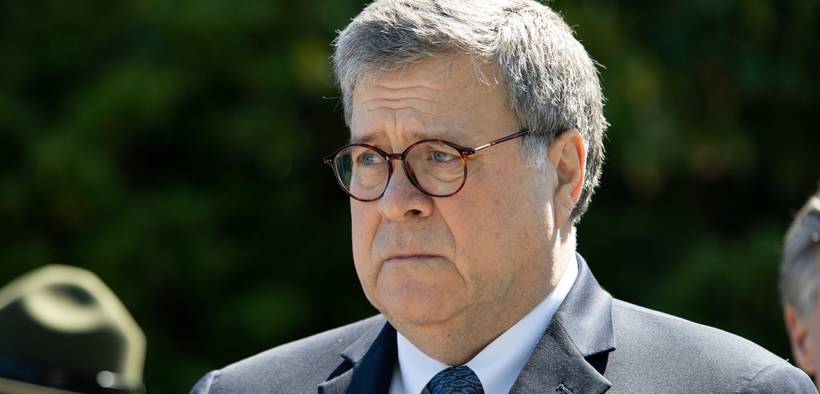From Citizen Truth
Barr's views on the role of religion in public life, while less publicized than his cheerleading for executive power, are equally virulent.Attorney General Bill Barr is by far the most dangerous member of Donald Trump's inner circle of neofascists, white supremacists, grifters, liars and enablers. Not only is Barr a hardline exponent of the "unitary executive theory," which promotes a broad expansion of presidential power, but he is also a true believer in the virtue and necessity of establishing a Christian theocracy in America.
Both beliefs threaten the core principles of what remains of our democracy in the age of Trump.
Barr's embrace of the unitary executive theory is well known. The theory, which has long been a favorite of the radical right, has its roots, innocently enough, in Article II, Section 1 of the Constitution, which provides: "The executive Power shall be vested in a President of the United States of America."
Unitary acolytes frequently invoke Alexander Hamilton's arguments in favor of a strong chief executive, set forth in Federalist Paper No. 70, as proof that the founding fathers intended to endow the president with sweeping controls.
But while the Constitution clearly establishes a single-person presidency as opposed to a committee, unitary extremists like Barr actually hold skewed and alarming views of the Constitution. As professors Karl Manheim and Allan Ides of Loyola Law School, Los Angeles, observed in an oft-quoted 2006 academic paper:
"In fact, the theory of the unitary executive is anything but an innocuous or unremarkable description of the presidency. In its stronger versions, it embraces and promotes a notion of consolidated presidential power that essentially isolates the Executive Branch from any type of congressional or judicial oversight. And it is much more than an academic theory. Rather it is an operative way of thinking about and applying Executive Branch power that has had, and will continue to have, real-world consequences for our republic and for the international community."
As a philosophy of government, the unitary theory was articulated as an explicit doctrine during the presidency of Ronald Reagan. In a book-length policy analysis published in 1981, titled Mandate for Leadership, the Heritage Foundation urged Reagan to curb the independence of federal agencies and centralize policymaking in his hands.
Among the early champions of the theory was Ed Meese, who served as counselor to the president in Reagan's first term in office and as attorney general in his second term. As he explained in his 1992 book, With Reagan: The Inside Story, Meese urged Reagan to maintain tight oversight over all executive-branch agency appointments to ensure that "our appointees" [are] the President's ambassadors to the agencies, not the other way around." Meese also advised Reagan to use presidential signing statements to augment his power by adding his views to the official legislative histories of statutes passed by Congress.
Meese joined the Heritage Foundation in 1988. Trump awarded him the Presidential Medal of Freedom in October 2019.
Samuel Alito was another early devotee of the unitary theory, leaving his imprint in a 1986 memorandum written while he was a deputy assistant attorney general in the Office of Legal Counsel (OLC). In the memo, Alito suggested that presidential signing statements include the president's interpretation of the constitutionality of federal laws. He also advised that such interpretations be followed by all executive departments and agencies. In 2006, Alito was confirmed as an associate justice of the Supreme Court.
Barr made a name for himself in unitary theory discourse in 1989, at the outset of the George H.W. Bush administration. Following his appointment as an assistant attorney general for the OLC, Barr penned a 10-page analysis aimed at combating what he claimed were "the ways Congress most often intrudes or attempts to intrude into the functions and responsibilities assigned by the Constitution to the executive branch."
Barr was especially concerned with blunting attempts by Congress to regulate the president's power to appoint and remove federal officers and employees at will, and to oversee the conduct of foreign affairs. Such legislative meddling, he contended, "unconstitutionally infringe[d] upon the unitary executive and must, therefore, be resisted."
Two years later, Barr advised H.W. that he had the power to send U.S. military forces into Iraq without congressional authorization. Shortly thereafter, Barr was nominated to become the nation's 77th attorney general, a position he held for the remainder of H.W.'s tenure.
In 2017, Barr reportedly turned down an offer to join Trump's personal legal team. But by the following June, Barr apparently sensed a need to defend the president against obstruction of justice charges that might be brought against him by special counsel Robert S. Mueller III, who was investigating alleged Russian interference in the 2016 election. In an unsolicited memo sent to the Justice Department, Barr offered a classic and unalloyed endorsement of the unitary theory, writing:
(Note: You can view every article as one long page if you sign up as an Advocate Member, or higher).






